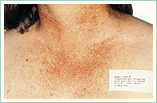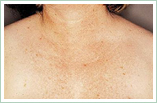Photodynamic Therapy (PDT) Guide
What is Photodynamic Therapy?
Photodynamic therapy (PDT) is a special treatment performed with a topical photosensitizing agent called Levulan (5-aminolevulinic acid or ALA) activated with the correct wavelength of light. This is also known as “ALA/ PDT treatment” or Levulan photofacial or Photodynamic Therapy. These treatments remove sun damaged precancerous zones and spots called actinic keratoses. Sun damage, fine lines, and blotchy pigmentation are also improved because of the positive effect of Levulan and the light treatment. ALA/PDT treatment also has the unique ability to minimize pores and reduce oil glands, effectively treating stubborn acne vulgaris, acne rosacea, and improve the appearance of some acne scars.
Photorejuvenation using intense pulsed light (IPL) is now the gold standard of non-ablative treatments. The most recent advance in photorejuvenation is photodynamic therapy (PDT), IPL, known as photodynamic skin rejuvenation. Photodynamic skin rejuvenation involves the application of Levulan, photosensitizing agent, which is then activated with IPL. This results in significant improvement in precancerous conditions such as Actinic Keratose (AK’S), actinically damaged skin, moderate to severe cystic acne and potentially superficial skin cancers. Additionally it improves wrinkles, pore size, skin texture, pigmentation, rosacea, sebaceous hyperplasia, and potentially prevents the development of skin cancer. Levulan is revolutionizing how we perform skin rejuvenation to treat damaged skin.
Photodynamic Therapy with Levulan for:
- Removing precancerous skin lesions
- Preventing Skin Cancer
- Improving wrinkles
- Improving pores
- Improving skin texture
- Improving pigmentation
- Treating moderate to severe cystic acne
- Treating sebaceous hyperplasia
How much improvement can I expect?
Patients with severe sun damaged skin manifested by Actinic Keratoses, texture, and tone changes including mottled pigmentation and skin laxity may see excellent results. You may also see improvement of large pores and pitted acne scars. Active acne can improve dramatically.
How many treatments will it take to see the “best” results?
To achieve maximum improvement of pre-cancerous (actinic keratoses) sun damage, skin tone and texture, a series of 2-3 treatments 2-4 weeks apart is most effective… Some patients with just actinic keratoses are happy with one treatment. More treatments can be done at periodic intervals in the future to maintain the rejuvenated appearance of the skin.
What are the disadvantages?
Following PDT, the treated areas can appear red and swollen with some peeling for 2-7 days. Some patients have an exuberant response to PDT, and experience marked redness of their skin. Temporary swelling of the lips and around your eyes can occur for a few days. Darker pigmented patches called liver spots can become temporarily darker and then peel off leaving normal skin. (This usually occurs over seven to ten days.) Repeat treatments may be necessary as medicine is not an exact science.
What are the advantages?
- Easier for patients than repeated topical liquid nitrogen, Efudex (5-Fu), or Aldara because the side effects are minimal and there is rapid healing.
- The ALA/PDT treatment is relatively painless vesus liquid nitrogen, 5-FU and Aldara.
- Reduced scarring and improved cosmetic outcome compared with cautery, surgery, and Efudex.
- Liquid notrogen can leave white spots on skin.
- Levulan improves the whole facial area treated creating one color, texture, and tone rather than just spot treating with liquid nitrogen, cautery, and surgery.
In summary, PDT matches the “Ideal treatment” for actinic damage:
- Well tolerated (essentially painless)
- Non-Invasive (no needles or surgery required)
- Excellent cosmetic outcome (particularly in sensitive areas of the face)
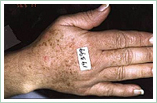 Pre-Treatment |
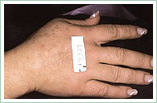 Post-Treatment |
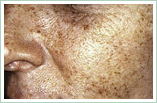 Pre-Treatment |
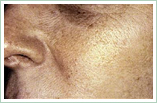 Post-Treatment |


